Faith and Politics
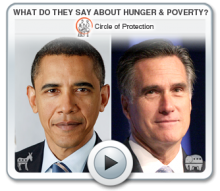
Christian leaders asked, and the presidential nominees answered. The poverty rate in America is still at a staggering 15 percent and 46.2 million Americans remain in poverty — what is your plan to address the problem?
The Circle of Protection, composed of Christian leaders from across the religious spectrum, released President Barack Obama's and GOP nominee Mitt Romney's video responses today at the National Press Club in Washington, D.C.
(VIDEOS from Obama and Romney after the jump.)
Religious rights activists are hailing the release over the weekend of an Iranian pastor accused of apostasy and a Pakistani girl who was charged with blasphemy.
Pastor Youcef Nadarkhani was released on Saturday after a six-hour hearing, reported the American Center for Law and Justice, which worked to garner American support for the minister’s release. The Christian convert had faced possible execution.
“Your prayers, your advocacy, and your voice has been heard,” read an online announcement from ACLJ.
The U.S. Commission on International Religious Freedom welcomed Nadarkhani’s release “after being unjustly imprisoned for three years because of his faith,” said its chair, Katrina Lantos Swett.
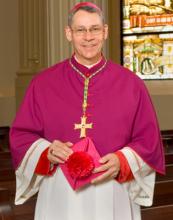
Finn, leader of the Diocese of Kansas City-St. Joseph and an outspoken conservative in the American hierarchy, was convicted of a single misdemeanor count for not telling police that one of his priests, the Rev. Shawn Ratigan, had taken hundreds of lewd images of children in Catholic schools and parishes.
But even as he became the first U.S. bishop ever convicted in criminal court for shielding an abusive priest, Finn’s standing inside the church appears uncertain, and the subject of intense debate.
Should he stay or should he go? Finn has indicated that he wants to tough it out.
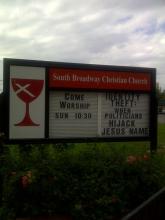
Gotta say I’m a big fan of this church sign at my father-in-law’s church.
It’s time to STOP:
- Using faith, Jesus, and the Bible as a political platform;
- Cherry-picking from the Gospel based on what polls well;
- Claiming Jesus would be so myopic to identify with either of our major political parties;
...
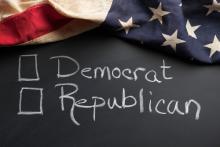
With the Republican and Democratic National Conventions having taken place over the last two weeks, we can officially say that we’re entering the election season (i.e., that time when the general public begins to pay attention).
A couple of friends who pastor churches in non-D.C. parts of the country asked me if we feel the need to address politics at The District Church, being in the very belly of the beast (my words, not theirs). Specifically, they were asking: Given the intense polarization and often-unproductive arguing that we see around us, even in the church, about the need to address how we interact with those who disagree with us.
So far, we haven’t needed to. In our church community, we have Republicans, Democrats, Independents, and yes, even people who don’t care about politics; we have Hill staffers, White House staffers, activists, advocates, lobbyists, policy wonks, and more — and we’ve all come together as the body of Christ, recognizing that our allegiance is first to Jesus before any party or even country.
Even so, every four years (or every two, if you pay attention to mid-terms; or all the time, if you’re even more politically engaged), posts about politics pop up with increasing frequency on social media, eliciting often-furious back-and-forths that usually end up doing nothing more than reminding each side how right they are and how stupid the other side is.
So I figured I’d try to offer a few suggestions on how we can engage with one another on matters of politics in healthy ways.

On the heels of the Republican National Convention, where the shadow of the Religious Right still ominously looms, it was notable that the Democratic National Convention opened with a debate over the absence of the divine name. It seems that the (original) official platform of the Democratic National Party had completely left God out.
Or, should I say, they completely left "God" out.
Whether God was actually M.I.A. is a profound theological and important question beyond the scope of semantic cameos. Yet the failure to baptize their platform with the faith-filled language of Charlotte, N.C.’s evangelical culture created quite a stir, both within and beyond convention walls.
Leading the charge for the defense of the divine was none other than Paul Ryan, who made the claim that the omission of "God" was "not in keeping with our founding documents."
Apparently, Mr. Ryan was not including the obscure document known as the Constitution, which contains no reference to God.
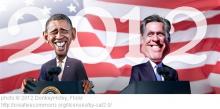
"In a democracy, the people get the government they deserve." – Alexis de Tocqueville
With the Democratic and Republican national conventions behind us, and an increase of political campaigning in front of us, we recognize the timeliness of the above quotation from Alexis de Tocquville. In a democracy the citizens choose their government, thus we indeed receive the government we deserve. As Lisa Sharon Harper recently stated:
"In its purest form, politics is simply how we organize our life together in society…in a Democratic Republic like our own, the [people are] ultimately responsible for the policies, laws, and structures that guide daily life. As we vote for candidates and ballot measures, we shape our society."
With such thoughts in mind, we affirm the collective ability to “shape our society," but we do so not only through the ability to choose our candidates and pass ballot measures, but we also possess the capacity to shape the process of how our leaders and policies are selected. In other words, while many complain about the high quantity and low quality of political campaigns, we are confronted with a harsh reality: In a democracy, we get the political campaigns we deserve.
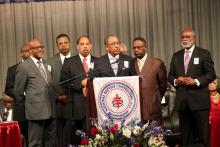
African-American clergy are joining forces with civil rights groups to push for increased voter registration ahead of the November election, spurred on by new voter laws they say restrict opportunities for minorities to enter the voting booth.
"We must vote because we must counteract the corrupt and diabolical strategies of those who are trying to take away our vote by passing laws to suppress and diminish our voting rights," said the Rev. Julius Scruggs, president of the National Baptist Convention, USA, at a news conference Wednesday (Sept. 5) during his denomination's Annual Session in Atlanta.
Scruggs, leaders of the National Association for the Advancement of Colored People and top officials of four other black Baptist groups gathered to rally against the new laws and continue longtime efforts to get blacks registered to vote.
More than two dozen new voter laws have passed in 19 states since 2011, according to the Brennan Center for Justice at New York University School of Law. Some have been overturned but others remain on the books, such as a voter ID law in New Hampshire and proof of citizenship requirements in Alabama, Kansas and Tennessee. Proponents say they prevent fraud, while opponents say they are reducing access to the polling booth.
The voting laws — through which some states have reduced early voting or required government-issued identification to enter the polls— have changed some of the clergy's voter education initiatives.
Chuck Norris has offered a dire warning to America, claiming that U.S. citizens face "1,000 years of darkness" if President Obama is reelected for a second term in November.
In a two-minute video posted on his official YouTube channel, which also includes work-out tutorials and promotional appearances for "The Expendables 2," Norris and his wife Gena warn of a "growing concern" that the America we know can be lost forever if Obama is reelected.
“If we look to history, our great country and freedom are under attack,” Norris says. “We’re at a tipping point and, quite possibly, our country as we know it may be lost forever if we don’t change the course in which our country is headed.”
Gena then cites the statistic that in 2008 more than 30 million Evangelical Christians stayed home on Voting Day and Obama won.

I’ve attempted to catch some of the Republican National Convention last week and this week’s Democratic National Convention. Some of it has been educational, others infuriating, others confusing, and still, others very inspiring.
I am listening and watching as I want to be more deeply educated and informed so I can steward the privilege of voting with care, prayer, and discernment. But thus far (and I know that the DNC has just gotten underway), one clear observation for me from both the RNC and DNC has been the amazing voices, words, leadership, and speeches from…the women.
The three that obviously stood out for me were the speeches delivered by Ann Romney, Condoleezza Rice, and Michelle Obama. Ann’s speech was heartfelt and compelling. Condoleezza’s speech was inspiring and dare I say it…”presidential.” And wow, Michelle Obama’s speech was simply riveting. I found myself in tears on couple occasions during the FLOTUS’ speech.
As I soaked in the inspiring speeches from these women, I was mindful of the incredulous fact that the 19th Amendment to the American constitution — allowing women to vote — only took place in 1920. Just 92 years ago and with that, America became just the 27th country to support “universal suffrage.”
Without any offense intended to others — especially the male speakers — their speeches were the clear highlights. I don’t care what others will do or say during the DNC from here on out, no one is going to top the speech delivered by Michelle Obama.
But this isn’t my attempt to say that women are better than men, more articulate than men, more intelligent than men, or any other nonsensical comparisons. Rather, I want to simply communicate how incomplete the conventions would have been without their voices, words, challenges, and exhortations.
Imagine if only men were allowed to speak.
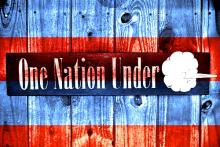
UDATE: (Posted 9/6/12)
Criticized by Republicans and some members of their own party, Democrats voted to restore the word “God” to the Democratic national platform late Wednesday (Sept. 5). The GOP had seized upon the omission as a failure of their opponents to appreciate the divine's place in American history.
GOP vice presidential nominee Paul Ryan took to the airwaves early Wednesday to blast the change from the Democrats’ 2008 platform. “I guess I would just put the onus and the burden on them to explain why they did all this, these purges of God,” Ryan said on “Fox & Friends.”
Ryan also attacked the Democratic platform’s initial failure to affirm Jerusalem as the capital of Israel, an issue important to some American Jews and conservative Christians. After a voice vote at the party's convention in Charlotte, language about God and endorsing Jerusalem as the capital was added.
God is mentioned 12 times in the 2012 GOP platform. The 2008 Democratic platform made one reference to God: the “God-given potential” of working people. The 2004 platform had numerous references to God.
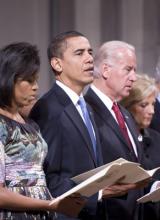
There aren't any white Protestants on the presidential ballot this year — a first in American history.
Instead, the race features two Catholic candidates for vice president, and a Mormon Republican and African-American mainline Protestant for president.
Perhaps lucky for all of them, voters care more about issues such as social justice or gay marriage than they do about denominational brands.
That's particularly true for Republican Mitt Romney and running mate Paul Ryan, who hope to woo evangelical voters that share their values rather than their theology.
It's a situation that probably would have baffled famous evangelicals such as the late Rev. Jerry Falwell, who used the issue of abortion in the 1970s and 1980s to turn evangelicals into a powerhouse voting bloc among Republicans.
"If you had told Jerry Falwell back in 1980 that by 2012 that there would not be a white Protestant on the ticket — he would have died right there," said Shaun Casey, professor of Christian ethics at Wesley Theological Seminary in Washington.
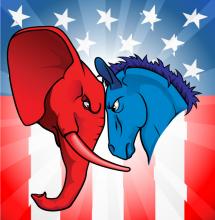
Someone asked me recently what I thought of something “as a member of the Christian Left.” My insides tightened and screeched into a ball. It was as if Freddy Krueger had run his sharpened fingernails across the black board in history class. Christian Left? Left of what? When did I sign that membership card?
Maybe it’s the title of my last book, Left, Right and Christ: Evangelical Faith in Politics, which was co-written with a Tea-Partier who is also an evangelical Christian. The book does frame me as the one on the left, but if you read my chapters you’ll see that is not my mind or my heart.
In times like these, when politicians are sweating to sway voters to their side, or frame their opponents as the polar opposite—the enemy—it is tempting to begin to define ourselves and each other through the frame of politics. We place each other in convenient little political boxes—boxes not made by scripture or the church, but by politicians and the media.
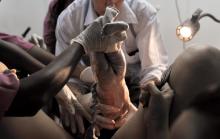
Every so often I hear the insinuation that women (like me) who advocate for "normal" childbirth are inordinately self-focused (even selfish) and that women who are dissatisfied with the treatment they’ve received in hospitals during labor are “uncheerful” and, possibly — according to the women in controversial pastor Douglas Wilson’s life — confused theologically.
Don’t get me wrong: Ricki Lake’s memoir, at least as it concerns childbirth, definitely looks at the birth experience as if it is all about her. But while there’s no question that medical advances (and, yes, c-sections!) save lives, it’s also hard to contest the fact that medical interventions occur at rates that are simply unjustified.
September 3 (Labor Day) launched “Empowered Birth Awareness Week,” which, sponsored by ImprovingBirth.org, aims to raise people’s consciousness concerning the notion of “evidence-based maternity care,” the less than radical notion that what happens during birth (ie, continuous fetal monitoring, mandatory IVs, NPO rules that prohibit eating and drinking) should be medically indicated, not routine, and supported by sound medical research.
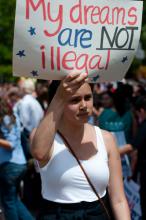
THIS SUMMER, in a historic development, nearly 150 evangelical leaders signed an “Evangelical Statement of Principles for Immigration Reform.” Signers came from across the spectrum of evangelicalism, from leading Latino evangelical organizations to pastors Max Lucado, Bill Hybels, Joel Hunter, and Jim Daly, president of Focus on the Family.
No, that isn’t a typo. Sojourners stood side by side with Focus on the Family to draw attention to the plight of millions who have been caught up in a broken system. It was exciting to see a unity across the traditional political spectrum that rarely happens in Washington.
Make no mistake: There are still big gaps in theology and politics among those in the group. But rather than politics, we focused on the things we agreed were fundamental moral issues and biblical imperatives. Instead of ideology, we came together because of morality and common sense.
Big things don’t change in Washington first; they change in the nation’s capital last. You’d think that with all the lobbyists on K Street and the billions of dollars being spent, Washington must be the country’s most important place. But this is the place where things don’t change, where politics maintains the status quo and the special interests maintain their own interests. Both Republicans and Democrats are more concerned with their political bases and getting re-elected than with the people and families whose lives are being crushed.
ON A WINDY morning this March, as the Supreme Court began hearing oral arguments about the health-care reform law, the Affordable Care Act (ACA), hundreds of people of faith gathered in front of the court building. As part of a public witness, they prayed and carried signs that proclaimed “People of Faith for Health Care.” Participants came from various faith traditions and denominations, many of which also signed an amicus brief in support of the ACA’s expansion of Medicaid to cover more low-income adults. The event was organized by two interfaith coalitions, Faithful Reform in Health Care and the Washington Interreligious Staff Community (WISC) Health Care Working Group.
The groups involved were motivated not by political beliefs but by a moral imperative, shared across faith traditions, to build a just society that cares for the poor, the sick, the widow, the orphan, and “the least of these.”
Those who gathered believe that their prayers on behalf of the uninsured were heard when, almost three months later to the day, the Supreme Court upheld the ACA. Chief Justice John Roberts’ vote with the more liberal justices led to the unlikely majority that provided a major step forward in the century-long struggle for health-care justice in the U.S.
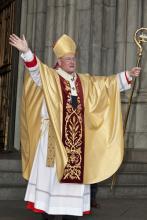
New York Cardinal Timothy Dolan, president of the U.S. Conference of Catholic Bishops, delivered his highly-anticipated benediction Thursday night to close out the Republican National Convention in Tampa.
Dolan will do the same for the Democrats next week in Charlotte, so this blessing seemed less like an imprimatur for the GOP than it would have had President Obama not taken the cardinal up on his offer to give the closing prayer after he accepts his party’s nomination.
Moreover, Cardinal Dolan’s four-minute prayer clearly had something for everyone – or, rather, something to cheer and challenge everyone in the hall.
He mentioned the importance of protecting the unborn, but also welcoming immigrants. His riff on religious freedom was a swipe at the birth control mandate, but he also mentioned the importance of “solidarity” and the “common good,” two bedrock principles of Catholic social teaching that the Republican platform – and especially Paul Ryan’s budget plans – are seen as undermining.

In their annual Labor Day statement, the U.S. Catholic bishops call for “national economic renewal that places working people and their families at the center of economic life.” Issued by Bishop Stephen Blaire of Stockton, Cal., chair of the Committee on Domestic Justice and Human Development, the statement emphasizes the reality that “Millions of Americans suffer from unemployment, underemployment or are living in poverty as their basic needs too often go unmet. This represents a serious economic and moral failure for our nation.”
The bishops then cite related issues in the news.
On the deficit:
“Public officials rightfully debate the need to reduce unsustainable federal deficits and debt. In the current political campaigns, we hear much about the economy, but almost nothing about the moral imperative to overcome pervasive poverty in a nation still blessed with substantial economic resources and power.”

As the Republicans leave Tampa and the Democrats prepare to gather in Charlotte, one dynamic is immediately clear in both parties: For the first time since Abraham Lincoln ran in 1860, no white Protestant will be on the ticket of either major party.
Mitt Romney, the newly minted Republican nominee for the White House, is a Mormon, though he clearly does not want to talk publicly about how his faith shapes his identity and personal values. Paul Ryan, his running mate, is a Catholic, a fact Romney made sure to mention in the vice presidential rollout ceremony. Indeed, Romney’s two closest rivals in the GOP presidential primaries were also Catholics: Newt Gingrich and Rick Santorum.
On the Democratic side, President Obama is an African-American Protestant despite the fetid conspiratorial screams that the president is a crypto-Muslim. Finally, Vice President Joe Biden, like Ryan, is an Irish-American Catholic.

On Aug. 17, three members of the Russian feminist punk band/performance art group Pussy Riot received the verdict in the criminal case against them: Guilty of "hooliganism" motivated by "religious hatred." Each was sentenced to two years in prison.
As a faith-based community organizer, I spend a great majority of my time trying to get political issues into the church so that the gospel can be relevant to the reality of those on and off the pews.
Therefore, I believe the best place for a “pussy riot” is the church. Although this may seem sacrilegious, here's why:
1. When the church ignores social and political issues it silently blesses injustice. (See slavery, the Holocaust, lynching, and child sexual abuse.) Testimony Time is a set time in many Black Churches when congregants can speak of their pains and triumphs and how God brought them through.
Testimony time is democratic and a time of raw honesty. I call what Pussy Riot did protestifying because they protested by testifying about the political conditions of their country.